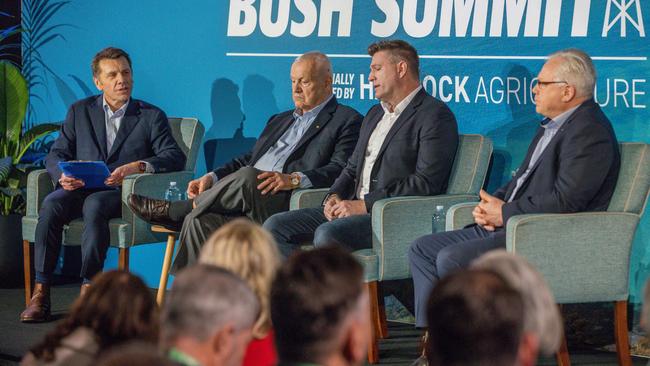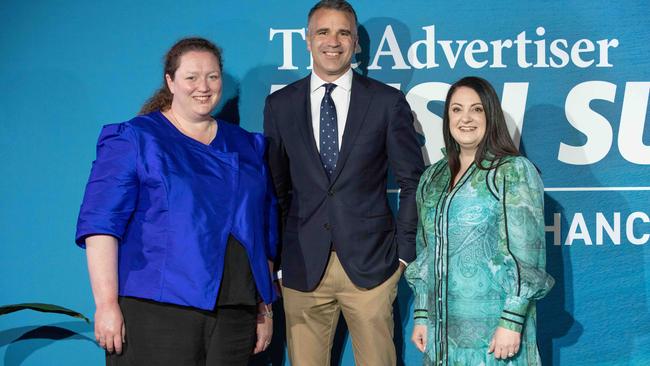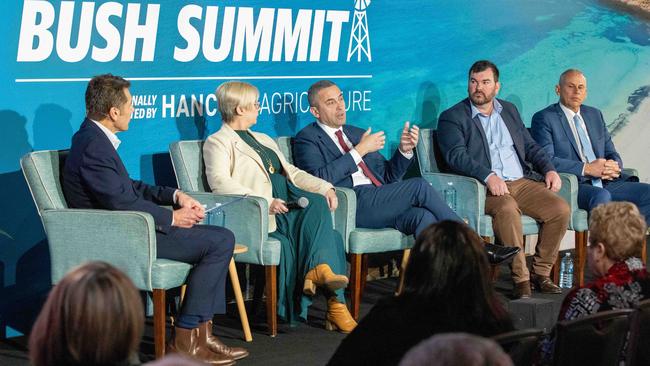Labour and housing shortages top of the agenda at The Advertiser Bush Summit in Port Lincoln
Some of the biggest players in regional South Australia have called for policy makers to address housing and labour shortages to allow them to supercharge our state.
Bush Summit
Don't miss out on the headlines from Bush Summit. Followed categories will be added to My News.
If there was an overarching theme to Tuesday’s Bush Summit it was people.
That the agriculture, aquaculture, fishing and mining would all grind to a halt without a skilled and engaged workforce, and attracting that workforce to our regions was the paramount concern for the industry leaders, politicians and young people who spoke at the Port Lincoln summit.
However almost all speakers pointed out the major issue of a shortage of housing and services in regional SA.
The Summit was MC’d by media personality Andrew “Cosi” Costello, who said that the Eyre Peninsula and its stunning coastline had captured a big piece of his heart.
“I think the coastline from Port Lincoln all the way up to Fowlers Bay is as good as any in Australia,” Mr Costello said.
“In fact Port Lincoln was nearly the capital. They rolled in and thought this would be a great spot – and I reckon they were spot on – but there was a shortage of water. So right from the start there were challenges in the regions.”
Port Lincoln tuna baron Hagen Stehr told the crowd about his journey from running away to the French Foreign Legion before joining the merchant navy and, eventually, jumping ship in Port Lincoln and building a fishing and aquaculture empire.
Mr Stehr said his business couldn’t succeed without investment in his people.
“I started my academy, which cost me a lot of bloody money, because I knew we needed to train people. Now we’re training people from all around Australia, the Philippines, Indonesia,” he said.
He described Port Lincoln’s seafood industry as “Mickey Mouse” when held up alongside northern hemisphere fishing nations like Norway, with huge potential for growth.
“Red tape is one of the big issues we face,” he said.
“We have to believe in this industry. When we first came here nobody believed in us (the immigrants who started much of Port Lincoln’s fishing industry).
“It’s all in front of us now, but we need to push it along.”

It was a sentiment backed by Thomas Foods head Darren Thomas.
“It’s not a cliche that people are your number one asset,” Mr Thomas said.
“All of businesses are in regions, so I’m very passionate about that. And it’s great to get people here, but how do we keep them here?”
Housing, Mr Thomas said, was key to solving this dilemma was housing.
“Sometimes I wonder if we’re a food processing company or a real estate company,” Mr Thomas said.
“We’ve just had to take that (housing staff) on ourselves, at a huge burden and cost. We often hear about the housing crisis in the city, but it’s many times worse in the regions.”
Mr Thomas said retaining good people in the regions, and discouraging from moving permanently to the city, was another important thing for country-based industries.
He said improving technology could help on this front, with high-speed internet across the less populated parts of South Australia a must.
“There are places in Mt Gambier where I still can’t use my phone, which is crazy,” he said.
“We need that technological infrastructure.
“What I’d really like to see is a real strategic plan that is implemented, not just sitting on a shelf, for the regions.”
Shaun Westcott, CEO of Mitsubishi Motors Australia, attracting people to the regions was important, but ultimately futile if they didn’t stay.
“It’s important to keep the wheels of this country rolling, and to do that we have to attract, and maintain, the right people,” Mr Westcott said.
“I believe the key solution is to grow your talent and provide opportunities so they’ll stay in the regions.”
Mr Westcott said reducing red tape around attracting skilled migrants to Australia would be a huge help to industry, as would reducing the price of land and housing.
“Why is land so expensive in a country this big?” he said.
“At the moment we’re looking at short term, almost crisis solutions, but eventually we’ll have to look at it with a wider lens. We’re sitting on a treasure chest. At the moment we are a quarry for the world … but we need to fire up the engine and become a powerhouse.”
Premier Peter Malinauskas told the Summit that “the single biggest constraint to growth in the state at the moment is access to people”.
“In some respects it’s a good problem to have,” he said.
“If you asked me ‘Peter, you have a choice between people being out of work or people who are trying to find people to do a job’, I’d probably take the latter problem.
“(But) you worry about unmet potential. You worry about opportunity not being realised because of a shortage of labour.
Mr Malinauskas said the issue required a mix of skilled migration, better skilling the existing workforce and engaging people in the labour market.
“Improving participation in labour – SA is still below the rest of the country. There’s a proportion of South Australians who are structurally unemployed,” he said.
“If you wake up this morning and want a job, you get one. There is a cohort who are completely disengaged with the labour market. We have to unlock that intergenerational welfare dependency.”
Adam Main, who’s helping CH4 Global establish seaweed-based aquaculture on the Eyre Peninsula to bring down methane emissions in cows, said the opportunities for regional business in the ag-tech space were incredibly exciting.
And, he said, developers could increase their profits by simply making their technology waterproof so it could be used in aquaculture too.
“It’s all about synergy, about bringing different ideas together,” Dr Main said.
Liberal Senator Anne Ruston praised the concept of the Bush Summit, and said it was vitally important for politicians and people in power to take notice of issues that came to the fore in such forums.
“I really hope the messages heard here are incorporated into policy,” Senator Ruston said.
“Lord knows Australia runs on the back of regional Australia.
“I think too often we see policy developed in the city by people who don’t really understand the regions. What works in Adelaide is not going to work in Port Lincoln and sure as hell isn’t going to work in Kimba.”
She said it was imperative to empower regional areas to take charge of their own futures, and implement policies that worked to improve local areas.
The disconnect between regional and urban Australia was a theme for Emily Riggs, founder of merino wool fashion label Iris & Wool.

Ms Riggs said she had recently heard a statistic that said 80 per cent of city people would describe their connection to farmers as distant or non-existent, a fact that she said needed to change.
She said her ultimate goal would be a scheme where fashion lovers could invest in a merino sheep, and follow the wool from the paddock, through shearing and processing and, eventually, it’s use in a jumper.
Warrick Duthy, the brains behind Clare’s Watervale Hotel and Kilikanoon Wines, said a lack of luxury accommodation in South Australia was holding the regions back.
“We have amazing wine regions and natural resources,” he said.
“The biggest roadblock is a lack of luxury tourism in exactly those places.
“A lot of tourist choose their holiday destination on the basis of the quality of the resort, not just what there is to do in that region.”

Mr Duthy said high-end accommodation that respected sustainability and sat within the natural landscape was in high demand around the globe.
And those tourists, Indigenous leader Parry Agius said, were also looking to experience Australia’s unique Aboriginal culture.
Mr Agius said the opportunities to forge relationships between tourism and Indigenous communities were many and varied.
“Aboriginal people are good at all things cultural, and they’re good at show and tell. They know their country,” he said.
“From my point of view tourism on a local level is a way of keeping culture alive. It’s about Partnering. Partnering. Partnering.
“We should think about how we can bring an Aboriginal perspective into the leadership of tourism.”




